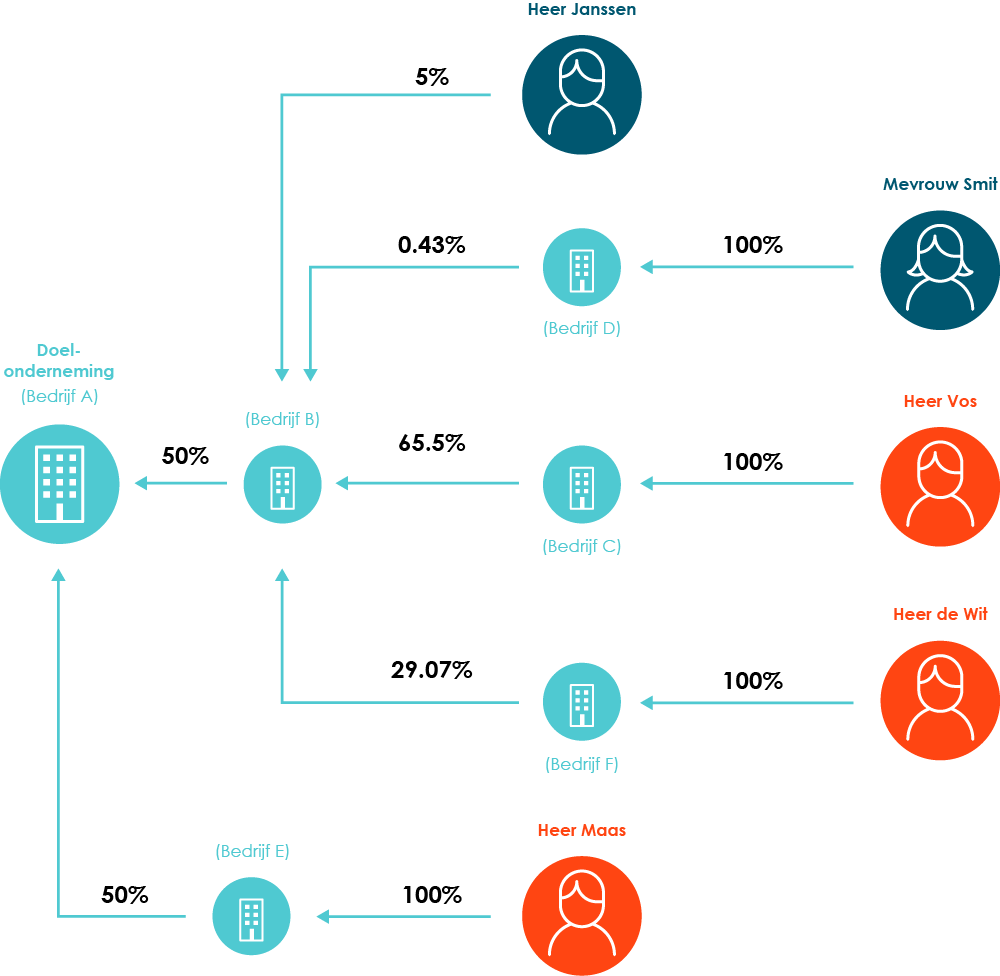UBO - Index
What is a UBO?
However, UBOs can hide. This is often done through holding companies and other corporate structures so you cannot immediately see who the UBO is. If this is not the case and there is no UBO, senior management or executives are designated as the UBO. This then becomes the pseudo-UBO called.
Still, there are some holes in this definition. For example, a different percentage applies in each country, and UBOs can also "hide" behind layers of other companies, holding companies or private limited companies. Determining a UBO is not so easy, and that while in Belgium you are obliged to determine the UBOs of your business relations and suppliers.

Is a UBO mandatory?
Within Belgium, the registration of UBOs is mandatory, but this depends on the legal form of the company. Internationally, there are different rules for registering UBOs. This differs per country.
According to the World Bank, information about UBOs is rarely included in public records. Simply because it is not mandatory. Governments and regulators are making efforts to ensure transparency of these UBO disclosures, but information about UBOs are not included in laws and regulations such as the AML and CTF laws.
In the EU, there are mutual agreements and it is mandatory to keep a UBO register for companies. In Belgium, virtually all companies are required to register a UBO in the Crossroads Bank for Enterprises (CBE). Below is a list of legal forms.
The following legal entities are mandatory to register their UBO(s):
• Corporations
• Non-profit organizations
• Foundations
• Trusts
• Similar entities
In Belgium, registration in the UBO register is mandatory, but in many countries registering a UBO is not. Many companies in Belgium are affiliated with companies abroad. Think of parent companies, sister companies or headquarters. So only finding out the UBO in Belgium is not enough.
You can often find out information about UBOs by asking a company itself. You then ask in writing for a list of companies and/or names that have 25% or more stake in the company. This requires relatively little research work. Remember that a company cannot be a UBO; a UBO is always a person. So you will have to find out the UBO of a company on a list that includes a company. By requesting this from the companies, you rely completely on the company and that the information provided is actually correct. In addition, no monitoring takes place. Even if you put the question to your (future) business partner, the responsibility remains with yourself.
Another option is to do your own research. You consult verified (international) sources. This keeps you in charge, but this can be a time-consuming task, especially internationally. You will have to deal with different ways of reporting. In some countries it is not mandatory to register a UBO so you will not be able to find out a UBO everywhere. In addition, in different countries you will also have to deal with different languages and therefore also any language barriers.
An external party can provide good support for this. The advantage of this is that you do not have to spend time on research yourself. However, you remain responsible for the results of the research. It is therefore important that you find a reputable partner for this cooperation.

The UBO register
The UBO register is a Dutch database of all beneficial owners of companies with a Dutch Chamber of Commerce number and a certain legal form (see is a UBO mandatory?). It stems from EU regulations that every European country must keep a UBO register. This register is public and contains information such as a UBO's first and last name, year of birth and nationality.
The UBO-database
In addition to the national UBO register, there is also the UBO database. The main difference between the UBO register and the UBO database, is that the UBO database is an international collection of UBOs, pseudo-UBOs and shareholders. It also lists UBOs as young as 0.01% interest, instead of 25% with the UBO register.
Does every country have a UBO registry?
No, a UBO register is not mandatory worldwide. There is no international UBO register. Within the EU, there is, and all European countries have a UBO register. You can often request this from the local chamber of commerce. There are some snags in this. Determining a UBO can be quite difficult internationally as soon as you do business outside the EU. Unfortunately, there is no international list of UBOs. The best chance of success is to find an international partner.
How many UBOs does a company have?
This varies by company. Any natural person who owns 25% or more in stock is a UBO. But contrary to what you might think, more than four individuals may well be a UBO within a company. UBO structures can get very complicated.

So you can see in this example that it is not immediately clear who the UBOs are. Both directly and indirectly, there are people with significant interests in the organizations. UBOs can also hide behind layers of limited liability companies. These complex structures make it difficult to identify UBOs.
Do UBOs change often?
UBOs can stay the same for years, or change rapidly. You won't readily realize this unless you monitor UBOs of organizations through a tool. You almost never get notification of changes in a UBO registry. It is important to know when a UBO changes. After all, the new UBO may be on a sanctions list, or may be a PEP (Politically Exposed Person). So there are more risks that can arise when UBOs change. A tool that monitors this for you may be the solution.
